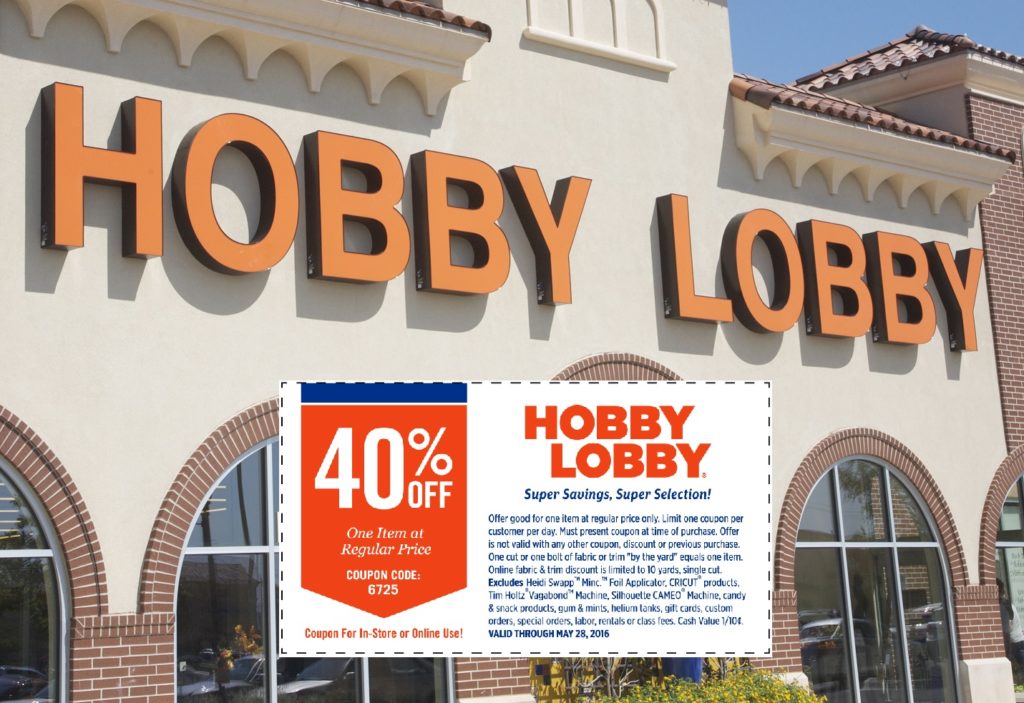
Imagine for a moment that you go into Kohl’s, or JCPenney, or any other store that features often-inflated “regular prices” atop their items’ actual selling prices, in an attempt to show just how low their prices are. If you have a coupon, you would no doubt expect to get a discount off the selling price – not off the “regular” price, which is probably just made up anyway.
But that’s not what happened to two Alabama shoppers. They were shocked at the “deals” they got when using coupons at a local crafts store. So now they’re suing, to get the discounts they say they deserved.
Diane Browning and David Phillips of suburban Birmingham each went shopping at a local Hobby Lobby store, six months apart. They both used the same coupon, and both say they were charged similarly inflated prices.
Browning bought a chest of drawers, using one of Hobby Lobby’s ubiquitous coupons that offer 40% off “one item at regular price”. The price tag on the chest noted that furniture is “always 30% off”, so Browning assumed the selling price of $202.99 was, in fact, the “regular price”.
Phillips had a similar experience. He bought museum glass that was marked “always 30% off”, and figured his coupon would apply to the $91.00 price that was “always” in place.
But that’s not how Hobby Lobby saw it. In both cases, the shoppers received 40% off the “regular” price. So Browning paid $173.99 instead of the $121.80 she thought she’d pay, and Phillips paid $78.00 instead of $45.60.
Their federal lawsuit centers on what the definition of “regular price” is.
“Simply put, the ‘regular’ price is the price at which an item is ‘regularly’ sold,” their lawsuit states, “not an artificial price that does not correspond to any sale of the item made by Hobby Lobby… Many items are ‘always’ on sale, but coupon discounts are taken from a price the item never sells at, which is most definitely not the regular price referenced in the coupon.”
Hobby Lobby breached the contract represented in their coupon, the lawsuit argues, by charging the two shoppers “a discount off of another, irrelevant, price, as opposed to the regular price of the item.”
So when is a sale not a sale?
In a case a couple of years ago, New York’s Attorney General said that “permanent sales” constituted false advertising. And the offender in that case, was Hobby Lobby itself.
“Hobby Lobby advertised its custom framing, furniture, and home decor products as sale items for more than 52 consecutive weeks,” Attorney General Eric Schneiderman announced in 2014. “Ultimately, a permanent sale is no sale at all.” Hobby Lobby agreed to change its advertising practices, contribute $138,600 in supplies to local schools, and pay $85,000 in civil penalties and other costs. “When companies mislead customers by advertising never-ending sales, our office will hold them accountable,” Schneiderman said.
Browning and Phillips say Hobby Lobby didn’t learn its lesson. They’re seeking class action status for their lawsuit, which claims deceptive trade practices and breach of contract. They both want the full 40% discount they say they should have received, plus potential punitive damages. And they’re asking for a court order to put a stop to the practice of representing everyday prices as “sale” prices.
So now, not only do you have to pay close attention to the fine print on your coupons, you have to pay close attention to a store’s price tags – and your receipt. Otherwise, you may never realize that the “deal” you’re getting is not really a deal at all.
Image source: Hobby Lobby











Hobby Lobby did change their sale. Now the coupon excludes furniture items and anything else that is always reduced like custom framing. So all these people did is cost people the extra 10% the coupon got you. Thanks a lot.